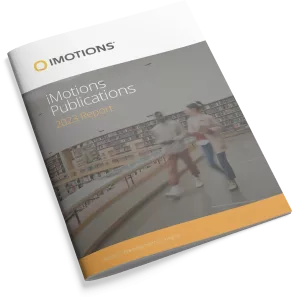-
Effects of sustained attention and video lecture types on learning performances
Video lectures are one of the primary learning resources embedded in e-learning environments. Many universities prepare video lectures and share them as open course materials with students. In order to make the learning process more efficient and effective, it is very important to design and personalize those learning resources for learners, taking into their needs […]
-
Measuring the Impact of Museum Architecture, Spaces and Exhibits on Virtual Visitors Using Facial Expression Analysis Software
Since the launch of online video portals in 2005, museums have encouraged visitors to upload and share their visits online. Although much has been written about visitors’ experiences in museums, very little exists on the impact virtual visits have on viewers. In this qualitative pilot study, a total of 2035 emotional reactions were recorded and analyzed after visiting […]
-
Sounds Healthy: Modelling sound-evoked consumer food choice through visual attention
Food choice is a multifaceted construct that is not solely guided by our internal incentives. In fact, sensory scientist, consumer psychologists, and marketers have demonstrated that external ambient cues, including background music, can influence myriads of subconscious consumer behaviors, effectively leading to increased sales of food and beverages. However, the vast majority of literature in […]
-
Sport and Cultural Events: Willingness to Pay, Facial Expressions and Skin Response
The topic of this particular study is to combine facial expressions, skin response and willingness to pay (WTP) using an iMotions Platform. This software solution combines biosensors in human behaviour research. A useful method to estimate WTP is contingent valuation method (CV) (Mitchell and Carson 1989). The method has been widely used in cultural economics […]
-
The Impact of Culture on Visual Design Perception
This paper questions the concept of universal users, taking a first step in looking at design perception differences between cultures, opening a discussion about culture in the context of HCI and more specifically interface interaction. This is done through a short study assessing participants from 3 cultures and their perception of interface by looking at […]
-
Analysis of Emotion and Recall in COVID-19 Advertisements: A Neuroscientific Study
In this research, neuroscience techniques are applied to the field of marketing in the analysis of advertisements that include the COVID-19 pandemic in their stories. A study of emotion and memory in these audiovisual productions is carried out as two fundamental factors for the knowledge of consumer habits and decision making. By means of facial […]
-
Does Eye-Tracking Have an Effect on Economic Behavior?
Eye-tracking is becoming an increasingly popular tool for understanding the underlying behavior driving economic decisions. However, an important unanswered methodological question is whether the use of an eye-tracking device itself induces changes in the behavior of experiment participants. We study this question using eight popular games in experimental economics. We implement a simple design where […]
-
Emotions in Reading and Learning from Texts: Progress and Open Problems
Reading texts can prompt intense emotions, and these emotions profoundly influence learning from texts. I first discuss the findings from the eight studies reported in this special issue. The studies represent pivotal advances in research on reading. Focusing on learning from science texts, they show that different emotions and different types of text influence reading […]
-
Cognitive and affective responses to marijuana prevention and educational messaging
Perceptions of risk of using marijuana have decreased significantly in the US over the last decade, while marijuana use has increased. In order to educate people on the risks associated with marijuana use, large-scale health messaging campaigns have been deployed to educate the public about the risks associated with marijuana use, particularly in states where […]
-
A Sound Prediction: EEG-Based Neural Synchrony Predicts Online Music Streams
Neuroforecasting predicts population-wide choices based on neural data of individuals and can be used, for example, in neuromarketing to estimate campaign successes. To deliver true value, the brain activity metrics should deliver predictive value above and beyond traditional stated preferences. Evidence from movie trailer research has proposed neural synchrony, which compares the similarity of brain […]
Research Report 2024
In-depth look at the scientific landscape as powered by iMotions software, showcasing groundbreaking research and the impact of our tools in various scientific and industrial fields.
iMotions Science Resources
Looking for white papers, validation reports or research show casing iMotions Multimodal capabilities?
Share Your Research

850+ universities worldwide with an iMotions human behavior lab
73 of the top 100 highest ranked universities
710+ published research papers using iMotions
iMotions is used for some of the most interesting human behavior research studies carried out by top researchers around the world. Contact us to have your publication featured here.
The authors of these publications have used iMotions as a software tool within their research.
“Software should be cited on the same basis as any other research product such as a paper or a book; that is, authors should cite the appropriate set of software products just as they cite the appropriate set of papers” (Katz et al., 2020).
We therefore encourage you to cite the use of iMotions where appropriate.
How to cite iMotions
APA
iMotions (10), iMotions A/S, Copenhagen, Denmark, (2024).
Note: adjust the version and year where relevant.
5 Most Popular Blogs
Learn How to Conduct Human Behavior Research with iMotions
Publications
Read publications made possible with iMotions
Blog
Get inspired and learn more from our expert content writers
Newsletter
A monthly close up of latest product and research news




